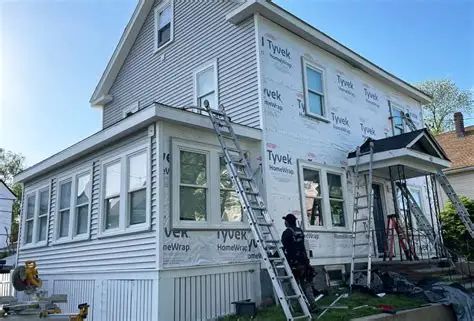Exploring the world of siding contractors near me, this introduction aims to provide a captivating glimpse into the importance of these professionals and the various siding materials they work with.
Delving deeper into the types of siding materials and the cost considerations involved, this discussion is sure to shed light on what to expect when hiring siding contractors for your home improvement projects.
Importance of Siding Contractors
When it comes to home improvement projects, siding contractors play a crucial role in enhancing the overall aesthetics and functionality of a property. Their expertise in installing, repairing, and maintaining siding can make a significant difference in the curb appeal and structural integrity of a home.
Enhancing Aesthetics and Functionality
- Siding contractors can help homeowners choose the right type of siding material that complements the architectural style of the property, enhancing its visual appeal.
- By professionally installing siding, contractors can improve the insulation and energy efficiency of the home, leading to lower utility bills and a more comfortable living environment.
- Properly maintained siding can protect the home from harsh weather conditions, preventing moisture damage, rot, and mold growth.
Professional Workmanship
- Hiring professional siding contractors ensures that the work is done correctly and meets industry standards, reducing the risk of future repairs or replacements.
- Experienced contractors have the skills and tools necessary to tackle any challenges that may arise during the siding installation or repair process, ensuring a high-quality outcome.
- Professional contractors are knowledgeable about local building codes and regulations, ensuring compliance and avoiding potential legal issues down the line.
Types of Siding Materials
When it comes to choosing siding materials for your home, there are several options available, each with its own set of pros and cons. Let's take a look at some common siding materials used in construction.
Vinyl Siding
- Pros: Affordable, low maintenance, comes in a variety of colors and styles.
- Cons: Not as durable as other materials, can crack or fade over time.
Wood Siding
- Pros: Natural appearance, environmentally friendly, can be painted or stained.
- Cons: Requires regular maintenance, susceptible to rot and pests.
Fiber Cement Siding
- Pros: Durable, fire-resistant, low maintenance, can mimic the look of wood or stone.
- Cons: More expensive than vinyl, can be heavy to install.
Metal Siding
- Pros: Very durable, resistant to fire, insects, and rot, can be recycled.
- Cons: Can dent or scratch easily, may require repainting over time.
Finding Local Siding Contractors
Finding a reputable siding contractor in your area is crucial to ensure quality work and a smooth experience. Here are some tips to help you in your search:
Checking Licenses, Insurance, and Reviews
Before hiring a siding contractor, it is important to verify their credentials. Make sure they are licensed to work in your area and have the necessary insurance coverage to protect you and your property in case of any accidents or damages
.
Additionally, take the time to read reviews from previous customers to get an idea of the contractor's reputation and work quality.
Benefits of Hiring Local Siding Contractors
When you hire a local siding contractor, you can benefit from their knowledge of local building codes and regulations, which can help ensure your project is compliant. Local contractors are also more accessible for any follow-up questions or concerns you may have after the job is completed.
By hiring a local contractor, you support businesses in your community and promote accountability due to their proximity.
Cost Considerations for Siding Projects
When considering a siding project for your home, it is essential to understand the cost implications involved. Various factors can influence the overall cost, from the type of siding material chosen to the size of your home and the complexity of the installation process.
Factors Influencing the Cost of Siding Projects
- The type of siding material: Different siding materials come at varying price points, with options like vinyl, wood, fiber cement, and aluminum each having their own cost considerations.
- The size of your home: The larger the surface area that needs to be covered with siding, the higher the overall cost will be.
- The condition of the existing siding: If there is old siding that needs to be removed or repairs that need to be made before installation, this can add to the total cost.
- The complexity of the installation: Factors such as the number of corners, windows, doors, and other architectural details can impact the labor costs involved in the installation process.
Breakdown of Typical Expenses in Hiring Siding Contractors
- Materials: This includes the cost of the siding material itself, as well as any additional materials needed for installation such as trim, flashing, and sealant.
- Labor: The cost of labor will depend on the size of the crew needed for the project and the hourly rates charged by the siding contractors.
- Permits and Inspections: Depending on local regulations, you may need to obtain permits for the siding project, which can add to the overall expenses.
- Cleanup and Disposal: Siding installation can generate a significant amount of waste, so factoring in the cost of cleanup and disposal is important.
Cost-Saving Tips and Budget-Friendly Options for Siding Installations
- Consider more budget-friendly siding materials: Opting for materials like vinyl or aluminum can help reduce costs compared to premium options like wood or fiber cement.
- Get multiple quotes: It's always a good idea to get quotes from multiple siding contractors to compare prices and find the best deal.
- Timing: Siding contractors may offer discounts during off-peak seasons, so timing your project accordingly can help save money.
- DIY where possible: If you have the skills and experience, you may be able to save money by taking on some of the simpler tasks yourself, such as removing old siding or painting.
Last Recap
In conclusion, siding contractors near me play a crucial role in enhancing the aesthetics and functionality of your property. By understanding the different siding materials available and the cost factors to consider, you'll be well-equipped to make informed decisions when embarking on your siding project.
Clarifying Questions
How can I find reputable siding contractors near me?
To find reputable siding contractors in your area, ask for recommendations from friends or neighbors, check online reviews, and verify their licenses and insurance.
What are the popular types of siding materials used by contractors?
Common siding materials used by contractors include vinyl, wood, fiber cement, and metal, each with its own pros and cons.
What factors influence the cost of siding projects?
The size of the project, choice of siding material, and complexity of installation are key factors that impact the cost of siding projects.














